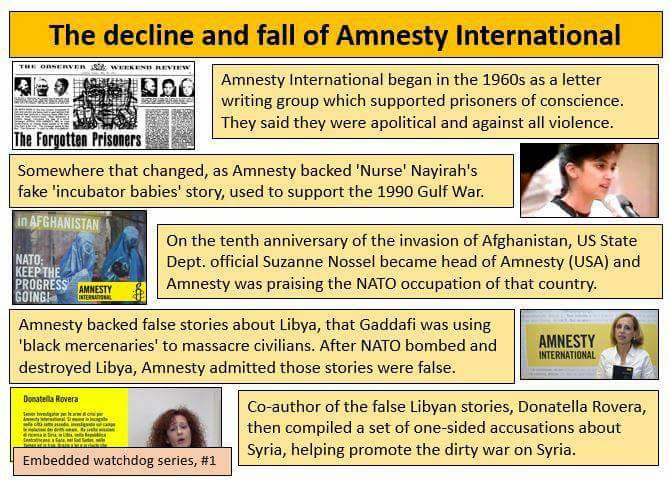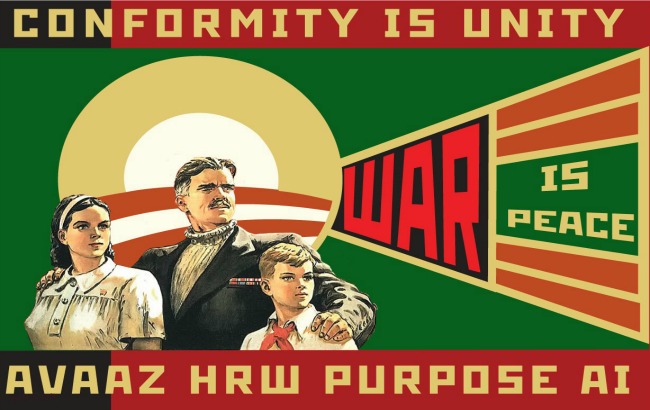
Prof Tim Anderson infographic demonstrates the Amnesty Internation weaponization of humanitarianism.
Most of us living outside Syria know very little of the country or its recent history. What we think we know comes via the media. Information that comes with the endorsement of an organisation like Amnesty International we may tend to assume is reliable. Certainly, I always trusted Amnesty International implicitly, believing I understood and shared its moral commitments.
As a decades-long supporter, I never thought to check the reliability of its reporting. Only on seeing the organisation last year relaying messages from the infamous White Helmets did questions arise for me.[1] Having since discovered a problem about the witness testimonies provided by Doctors Without Borders (MSF), I felt a need to look more closely at Amnesty International’s reporting.[2] Amnesty had been influential in forming public moral judgements about the rights and wrongs of the war in Syria.
What if Amnesty’s reporting on the situation in Syria was based on something other than verified evidence?[3] What if misleading reports were instrumental in fuelling military conflicts that might otherwise have been more contained, or even avoided?
Amnesty International first alleged war crimes in Syria, against the government of President Bashar Al-Assad, in June 2012.[4] If a war crime involves a breach of the laws of war, and application of those laws presupposes a war, it is relevant to know how long the Syrian government had been at war, assuming it was. The UN referred to a ‘situation close to civil war’ in December 2011.[5] Amnesty International’s war crimes in Syria were therefore reported on the basis of evidence that would have been gathered, analysed, written up, checked, approved and published within six months.[6] That is astonishingly – and worryingly – quick.
The report does not detail its research methods, but a press release quotes at length, and exclusively, the words of Donatella Rovera who ‘spent several weeks investigating human rights violations in northern Syria.’  As far as I can tell, the fresh evidence advertised in the report was gathered through conversations and tours Rovera had in those weeks.[7] Her report mentions that Amnesty International ‘had not been able to conduct research on the ground in Syria’.[8]
As far as I can tell, the fresh evidence advertised in the report was gathered through conversations and tours Rovera had in those weeks.[7] Her report mentions that Amnesty International ‘had not been able to conduct research on the ground in Syria’.[8]
I am no lawyer, but I find it inconceivable that allegations of war crimes made on this basis would be taken seriously. Rovera herself was later to speak of problems with the investigation in Syria: in a reflective article published two years afterwards,[9] she gives examples of both material evidence and witness statements that had misled the investigation.[10] Such reservations did not appear on Amnesty’s website; I am not aware of Amnesty having relayed any caveats about the report, nor of its reviewing the war crimes allegations. What I find of greater concern, though, given that accusations of crimes already committed can in due course be tried, is that Amnesty also did not temper its calls for prospective action. On the contrary.
In support of its surprisingly quick and decisive stance on intervention, Amnesty International was also accusing the Syrian government of crimes against humanity. Already before Deadly Reprisals, the report Deadly Detention had alleged these. Such allegations can have grave implications because they can be taken as warrant for armed intervention.[11] Whereas war crimes do not occur unless there is a war, crimes against humanity can be considered a justification for going to war. And in war, atrocities can occur that would otherwise not have occurred.
I find this thought deeply troubling, particularly as a supporter of Amnesty International at the time it called for action, the foreseeable consequences of which included fighting and possible war crimes, by whomsoever committed, that might otherwise never have been. Personally, I cannot quite escape the thought that in willing the means to an end one also shares some responsibility for their unintended consequences.[12]
If Amnesty International considered the moral risk of indirect complicity in creating war crimes a lesser one than keeping silent about what it believed it had found in Syria, then it must have had very great confidence in the findings. Was that confidence justified?
If we go back to human rights reports on Syria for the year 2010, before the conflict began, we find Amnesty International recorded a number of cases of wrongful detention and brutality.[13]
In the ten years Bashar Al-Assad had been president, the human rights situation seemed to Western observers not to have improved as markedly as they had hoped. Human Rights Watch spoke of 2000-2010 as a ‘wasted decade’.[14] The consistent tenor of reports was disappointment: advances achieved in some areas had to be set against continued problems in others. We also know that in some rural parts of Syria, there was real frustration at the government’s priorities and policies.[15] An agricultural economy hobbled by the poorly managed effects of severe drought had left the worst off feeling marginalized. Life may have been good for many in vibrant cities, but it was far from idyllic for everyone, and there remained scope to improve the human rights record. The government’s robust approach to groups seeking an end to the secular state of Syria was widely understood to need monitoring for reported excesses. Still, the pre-war findings of monitors, are a long way from any suggestion of crimes against humanity. That includes the findings of Amnesty International Report 2011: the state of the world’s human rights.
A report published just three months later portrays a dramatically different situation.[16]
In the period from April to August 2011, events on the ground had certainly moved quickly in the wake of anti-government protests in parts of the country, but so had Amnesty…
CONTINUE READING AT TIM HAYWARD’S BLOG
“Reality. Amnesty International has taken the amnesty out of humanity and became a killing tool by using criminals they call dissidents, political opposition and human rights activists in countries of interest.” ~ Amnesty International: Infamous Tools of Conspiracies.

Image produced by Cory Morningstar of Wrong Kind of Green.
***
FURTHER READING ON THE WEAPONIZATION OF HUMANITARIANISM BY AMNESTY INTERNATIONAL:
Smart Power and the Human Rights Industrial Complex by Patrick Henningsen
Amnesty International – Imperialist Tool by Prof Francis Boyle
Amnesty International – Whitewashing another Massacre by Paul De Rooij
Amnesty International – Infamous Tool of Conspiracies by Tefsa News
George Soros Anti-Syria Campaign Impresario by Vanessa Beeley
READ MORE SYRIA NEWS AT: 21st Century Wire Syria Files
SUPPORT 21WIRE and its work by Subscribing and becoming a Member @ 21WIRE.TV















